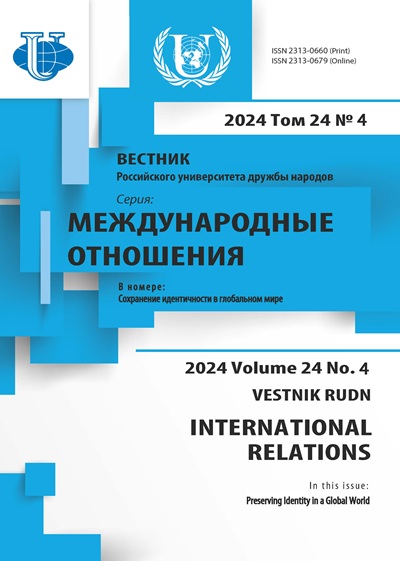The Specificity of Afghan Identity in the Context of Globalization
- 作者: Machitidze G.G.1
-
隶属关系:
- MGIMO University
- 期: 卷 24, 编号 4 (2024): Preserving Identity in a Global World
- 页面: 508-519
- 栏目: THEMATIC DOSSIER
- URL: https://journals.rudn.ru/international-relations/article/view/42193
- DOI: https://doi.org/10.22363/2313-0660-2024-24-4-508-519
- EDN: https://elibrary.ru/LSYOBP
如何引用文章
详细
The article addresses the issue of identifying a Muslim country in the context of globalization, with Afghanistan serving as a case study. For almost 20 years, Western attempts to introduce liberal democratic values into Afghan society have failed. The author highlights the fact that Afghan society has remained wary of elements of globalization for fear of losing its cultural and religious identity. Having established a theocratic regime, the Taliban (recognized as terrorist and banned in Russia) set about restructuring the principles of Afghan nationalism in line with Islamic nationalism. The idea of Islam as a state identity implies that Islam as a comprehensive identity is capable of neutralizing ethnic differences in society. In taking steps to renew the ideological superstructure of the Afghan state, the Taliban (recognized as terrorist and banned in Russia) put forward a new concept termed ‘Talibanism.’ The features and reasons for the shift of the Islamic Emirate of Afghanistan’s leadership away from traditional Deobandism and towards a more acceptable combination of religious-Puritan beliefs adapted to the strict precepts of Islamic law are analyzed. It is concluded that ‘Talibanism’ rejects all forms of republican government and makes a clear distinction between Islamic law and man-made laws, considering the latter to be immoral. The main trend of Kabul’s domestic policy, aimed at re-Islamisation of the insufficiently Islamized Afghan society on a voluntary or coercive basis, is shown. The concept envisages the imposition of a single Islamic identity on Afghan society, accompanied by the violation of women’s rights in employment and education. The rationale behind the Taliban’s (recognized as terrorist and banned in Russia) policy is the belief that Afghan society is degenerating from within and is subject to a process of external destruction that must be stopped. It is observed that the Taliban (recognized as terrorist and banned in Russia) leaders have been influenced in changing their views by their prolonged contacts with representatives of Al-Qaeda (recognized as terrorist and banned in Russia) and other jihadist organizations. The study found that the Taliban (recognized as terrorist and banned in Russia) ideology has acquired some similarities with Salafism, and that the authorities are trying to isolate the Afghan people from the processes of globalization, being ready to protect Islamic values from Western civilization by any means necessary.
作者简介
Georgy Machitidze
MGIMO University
编辑信件的主要联系方式.
Email: mggkabul@gmail.com
ORCID iD: 0000-0003-2402-1909
SPIN 代码: 5094-7995
PhD (History), Senior Research Fellow, Institute of International Relations
Moscow, Russian Federation参考
- Baranovsky, V. G., & Naumkin, V. V. (2018). The Middle East in the changing global context: The key trends of centennial development. World Economy and International Relations, 62(3), 5-19. (In Russian). https://doi.org/10.20542/0131-2227-2018-62-3-5-19; EDN: YTHIDG
- Chang, L., Pengtao, G., & Xiyao, Z. (2022). Power hedging and faith fetters: The factors of tribe and religion in Afghanistan’s state building. Frontiers in Political Science, (4), 1-11. https://doi.org/10.3389/fpos.2022.976833
- Flier, A. Ya. (2010). The future is not a subject for return (on the prospects for development of traditional cultures). Kul’turologicheskii Zhurnal, (1), 1-8. (In Russian). EDN: OWPNYB
- Gerasimova, I. A., Ivakhnov, V. Yu. (2017). The problem of preservation of cultural identity in conditions of globalization. Service Plus, 11(2), 66-76. (In Russian). https://doi.org/10.22412/1993-7768-11-2-9; EDN: YRCEOX
- Goldstein, W. S. (2010). Secularization and the Iranian revolution. Centre for Sociological Studies, (3), 50-67.
- Knyazev, A. A. (2021). Regarding the issue of history of the Afghan Taliban movement (the middle and second half of the 1990s). Bulletin of the South Ural State University. Series: Social Sciences and the Humanities, 21(4), 13-21. (In Russian). EDN: QGEZGR
- Korgun, V. G. (2004). History of Afghanistan. 20th century. Moscow: IV RAN publ. (In Russian). EDN: QOVWLZ
- Kutyrеv, V. A. (2009). Clash of cultures with civilization as the cause and ground of international terrorism. Vek Globalizatsii, (2), 92-102. (In Russian). EDN: MTXRHL
- Long, D. (2022). Ideological transition of the Afghan Taliban. Contemporary International Relations, 32(2), 39-61.
- Machitidze, G. G. (2020). Strategy in Afghanistan: Artifact of President D. Trump. Russia and the Contemporary World, (1), 119-138. (In Russian). https://doi.org/10.31249/rsm/2020.01.07; EDN: PLZRUJ
- Malygina, I. V. (2021). Cultural identities in a post-global world. Vestnik of Moscow State Linguistic University. Humanities, (13), 348-361. (In Russian). https://doi.org/10.52070/2542-2197_2021_13_855_348; EDN: LOQOWW
- Mendel, J. (2010). Afghanistan, networks and connectivity. Geopolitics, 15(4), 726-751. https://doi.org/10.1080/14650041003718333
- Mosyakov, D. V., Shpakovskaya, M. A., Ponka, T. I., & Danilov, V. A. (2024). Pivot to the East as a factor in strengthening Russian influence in Asia. Vestnik RUDN. International Relations, 24(2), 181-191. https://doi.org/10.22363/2313-0660-2024-24-2-181-191; EDN: VKTZMO
- Naumkin, V. V. (2014). On the civilizational identification and the crisis of the nation states. Vostok. Afro-Aziatskie Obshchestva: Istoriia i Sovremennost, (4), 5-20. (In Russian). EDN: SJSWMF
- Naumkin, V. V. (2020). Non-West model: Does the civilization-state exist? Polis. Political Studies, (4), 78-93. (In Russian). https://doi.org/10.17976/jpps/2020.04.06; EDN: TPQYUS
- Novikova, O. N. (2023). Afghanistan: From “democratic authoritarianism” to authoritarianism per se. Current Problems of Europe, (1), 223-243. (In Russian). https://doi.org/10.31249/ape/2023.01.10; EDN: OOXJTZ
- Sazhin, V. I. (2006). Features of Afghan democracy. In M. R. Arunova (Ed.), Afghanistan, Iran, Pakistan: Time of elections and changes (pp. 50-57). Moscow: Institut vostokovedeniya RAN publ. EDN: QPCCQX
- Sikoev, R. R. (2002). Taliban (religious-political portrait). Moscow: IV RAN publ. (In Russian).
- Taj, F. (2022). Clash of identities: Ontological (in)securities of Afghanistan and Pakistan, and the repercussions. Policy Perspectives, 19(2), 1-20. https://doi.org/10.13169/polipers.19.2.ra1
- Tetushkina, S. A. (2010). Westernization as a socio-cultural phenomenon. Sotsial’no-Gumanitarnye Znaniya, (1), 350-356. (In Russian). EDN: LAFVFH
- Zhuckova, N. G. (2006). Globalization and the perpetuation of national identity. Filosofiya i Obshchestvo, (2), 146-153. (In Russian). EDN: QOYRXF








